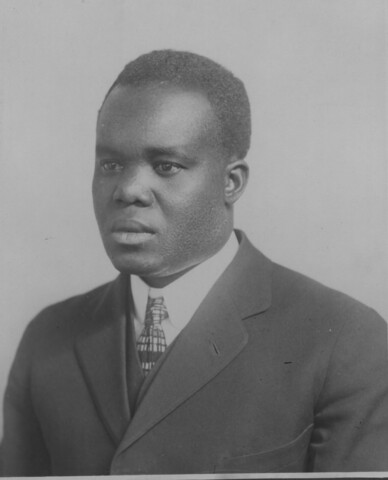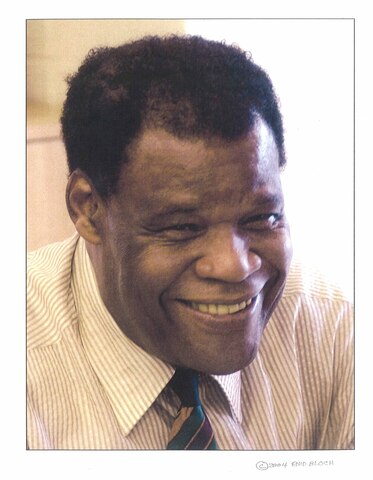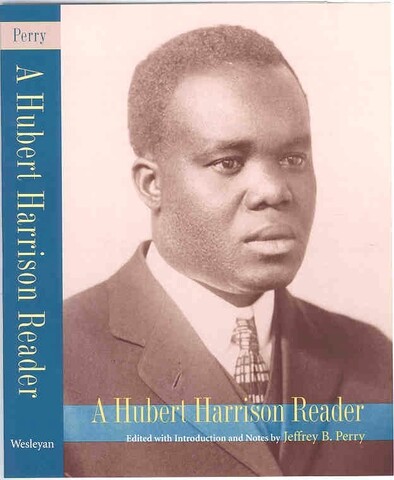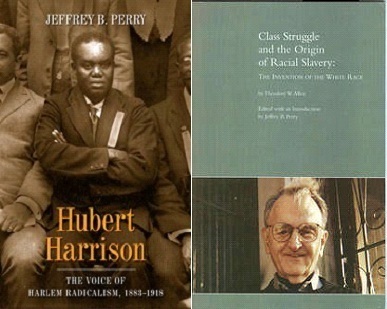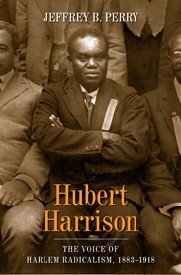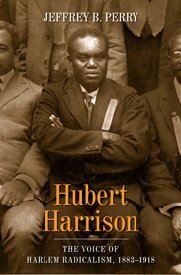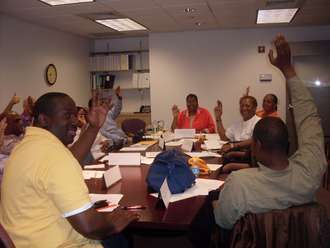December 17th Marks the 91st anniversary of the death of Hubert Harrison in 1927 at age 44. – Please help to spread the word about his important life and work. For writings by and about Hubert Harrison see -- HERE
Hubert Harrison (1883-1927) is one of the truly important figures of early twentieth-century America. A brilliant writer, orator, educator, critic, and political activist, he was described by the historian Joel A. Rogers, in "World’s Great Men of Color" as “the foremost Afro-American intellect of his time.” Labor and civil rights leader A. Philip Randolph described Harrison as “the father of Harlem Radicalism.” Harrison’s friend and pallbearer, Arthur Schomburg, fully aware of his popularity, eulogized to the thousands attending Harrison’s Harlem funeral that he was also “ahead of his time.”
Born in St. Croix, Danish West Indies, in 1883, to a Bajan mother and a Crucian father, Harrison arrived in New York as a seventeen-year-old orphan in 1900. He made his mark in the United States by struggling against class and racial oppression, by helping to create a remarkably rich and vibrant intellectual life among African Americans, and by working for the enlightened development of the lives of “the common people.” He consistently emphasized the need for working class people to develop class-consciousness; for “Negroes” to develop race consciousness, self-reliance, and self-respect; and for all those he reached to challenge white supremacy and develop modern, scientific, critical, and independent thought as a means toward liberation.
A self-described “radical internationalist,” Harrison was extremely well-versed in history and events in Africa, Asia, the Mideast, the Americas, and Europe. More than any other political leader of his era, he combined class-consciousness and anti-white supremacist race consciousness in a coherent political radicalism. He opposed capitalism and maintained that white supremacy was central to capitalist rule in the United States. He emphasized that “politically, the Negro is the touchstone of the modern democratic idea”; that “as long as the Color Line exists, all the perfumed protestations of Democracy on the part of the white race” were “downright lying,” that “the cant of ‘Democracy’” was “intended as dust in the eyes of white voters,” and that true democracy and equality for “Negroes” implied “a revolution . . . startling even to think of.”
Working from this theoretical framework, he was active with a wide variety of movements and organizations and played signal roles in the development of what were, up to that time, the largest class radical movement (socialism) and the largest race radical movement (the “New Negro”/Garvey movement) in U.S. history. His ideas on the centrality of the struggle against white supremacy anticipated the profound transformative power of the Civil Rights/Black Liberation struggles of the 1960s and his thoughts on “democracy in America” offer penetrating insights on the limitations and potential of America in the twenty-first century.
Harrison served as the foremost Black organizer, agitator, and theoretician in the Socialist Party of New York during its 1912 heyday; he founded the first organization (the Liberty League) and the first newspaper (The Voice) of the militant, World War I-era “New Negro” movement; and he served as the editor of the “Negro World” and principal radical influence on the Garvey movement during its radical high point in 1920. His views on race and class profoundly influenced a generation of “New Negro” militants including the class radical A. Philip Randolph and the race radical Marcus Garvey. Considered more race conscious than Randolph and more class conscious than Garvey, Harrison is a key ideological link in the two great trends of the Black Liberation Movement -- the labor and civil rights trend associated with Martin Luther King, Jr., and the race and nationalist trend associated with Malcolm X. (Randolph and Garvey were, respectively, the direct links to King marching on Washington, with Randolph at his side, and to Malcolm, whose parents were involved with the Garvey movement, speaking militantly and proudly on street corners in Harlem.)
Harrison was not only a political radical, however. J. A. Rogers described him as an “Intellectual Giant and Free-Lance Educator,” whose contributions were wide-ranging, innovative, and influential. He was an immensely skilled and popular orator and educator who spoke and/or read six languages; a highly praised journalist, critic, and book reviewer (reportedly the first regular book reviewer in “Negro newspaperdom”); a pioneer Black activist in the freethought and birth control movements; a bibliophile and library builder and popularizer who helped develop the 135th Street Public Library into what became known as the internationally famous Schomburg Center for Research in Black Culture; a pioneer Black lecturer for the New York City Board of Education and one of its foremost orators). His biography offers profound insights on race, class, religion, immigration, war, democracy, and social change in America.
For information on vol. 1 of the biography of Hubert Harrison see HERE
and see HERE
and also see HERE
Read More
Hubert Harrison (1883-1927) is one of the truly important figures of early twentieth-century America. A brilliant writer, orator, educator, critic, and political activist, he was described by the historian Joel A. Rogers, in "World’s Great Men of Color" as “the foremost Afro-American intellect of his time.” Labor and civil rights leader A. Philip Randolph described Harrison as “the father of Harlem Radicalism.” Harrison’s friend and pallbearer, Arthur Schomburg, fully aware of his popularity, eulogized to the thousands attending Harrison’s Harlem funeral that he was also “ahead of his time.”
Born in St. Croix, Danish West Indies, in 1883, to a Bajan mother and a Crucian father, Harrison arrived in New York as a seventeen-year-old orphan in 1900. He made his mark in the United States by struggling against class and racial oppression, by helping to create a remarkably rich and vibrant intellectual life among African Americans, and by working for the enlightened development of the lives of “the common people.” He consistently emphasized the need for working class people to develop class-consciousness; for “Negroes” to develop race consciousness, self-reliance, and self-respect; and for all those he reached to challenge white supremacy and develop modern, scientific, critical, and independent thought as a means toward liberation.
A self-described “radical internationalist,” Harrison was extremely well-versed in history and events in Africa, Asia, the Mideast, the Americas, and Europe. More than any other political leader of his era, he combined class-consciousness and anti-white supremacist race consciousness in a coherent political radicalism. He opposed capitalism and maintained that white supremacy was central to capitalist rule in the United States. He emphasized that “politically, the Negro is the touchstone of the modern democratic idea”; that “as long as the Color Line exists, all the perfumed protestations of Democracy on the part of the white race” were “downright lying,” that “the cant of ‘Democracy’” was “intended as dust in the eyes of white voters,” and that true democracy and equality for “Negroes” implied “a revolution . . . startling even to think of.”
Working from this theoretical framework, he was active with a wide variety of movements and organizations and played signal roles in the development of what were, up to that time, the largest class radical movement (socialism) and the largest race radical movement (the “New Negro”/Garvey movement) in U.S. history. His ideas on the centrality of the struggle against white supremacy anticipated the profound transformative power of the Civil Rights/Black Liberation struggles of the 1960s and his thoughts on “democracy in America” offer penetrating insights on the limitations and potential of America in the twenty-first century.
Harrison served as the foremost Black organizer, agitator, and theoretician in the Socialist Party of New York during its 1912 heyday; he founded the first organization (the Liberty League) and the first newspaper (The Voice) of the militant, World War I-era “New Negro” movement; and he served as the editor of the “Negro World” and principal radical influence on the Garvey movement during its radical high point in 1920. His views on race and class profoundly influenced a generation of “New Negro” militants including the class radical A. Philip Randolph and the race radical Marcus Garvey. Considered more race conscious than Randolph and more class conscious than Garvey, Harrison is a key ideological link in the two great trends of the Black Liberation Movement -- the labor and civil rights trend associated with Martin Luther King, Jr., and the race and nationalist trend associated with Malcolm X. (Randolph and Garvey were, respectively, the direct links to King marching on Washington, with Randolph at his side, and to Malcolm, whose parents were involved with the Garvey movement, speaking militantly and proudly on street corners in Harlem.)
Harrison was not only a political radical, however. J. A. Rogers described him as an “Intellectual Giant and Free-Lance Educator,” whose contributions were wide-ranging, innovative, and influential. He was an immensely skilled and popular orator and educator who spoke and/or read six languages; a highly praised journalist, critic, and book reviewer (reportedly the first regular book reviewer in “Negro newspaperdom”); a pioneer Black activist in the freethought and birth control movements; a bibliophile and library builder and popularizer who helped develop the 135th Street Public Library into what became known as the internationally famous Schomburg Center for Research in Black Culture; a pioneer Black lecturer for the New York City Board of Education and one of its foremost orators). His biography offers profound insights on race, class, religion, immigration, war, democracy, and social change in America.
For information on vol. 1 of the biography of Hubert Harrison see HERE
and see HERE
and also see HERE
Read More
